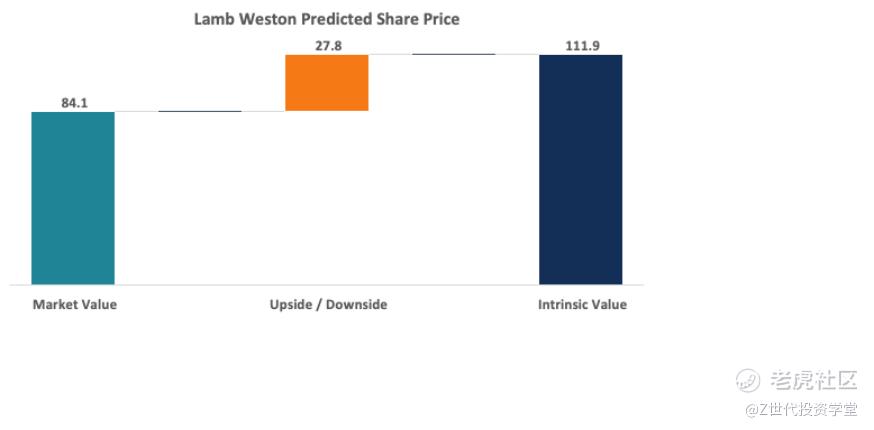04 Valuation
Figure 3: LW Valuation
A discounted cash flow (DCF) valuation model was used to value the business. Using conservative financial estimates and valuation multiples to forecast for the next 5 years, a 33.03% upside was derived.
05 Risks
5.1 Climate Change
LW's reliance on specific regions known for optimal potato growing conditions exposes it to the risks associated with climate change. Unpredictable weather events such as extreme heat, droughts, heavy rainfalls, and flooding can adversely affect potato crop performance. For example, the poor quality of the crop in the Pacific Northwest in 2021 resulted in lower raw potato utilization rates and increased production costs. Moreover, the geographic concentration of ideal growing conditions in regions like Washington, Idaho, and Oregon in the U.S., as well as certain European countries, amplifies the risk of unfavourable crop conditions impacting production capabilities. These climate-related challenges not only disrupt LW's potato supply chain but also strain its ability to meet customer demand, potentially leading to decreased profitability.
5.2 Supply Chain Disruptions
LW’s supply chain is vulnerable to disruptions caused by unforeseen events such as natural disasters and labour shortages. Such disruptions impede the timely delivery of raw materials and finished products, leading to production delays, increased costs, and diminished profitability. The previous COVID-19 pandemic and ongoing war in Ukraine have already impacted the company’s supply chain, resulting in temporary workforce disruptions, labour shortages, and increased transportation and warehousing costs. Furthermore, any failure by LW’s suppliers, logistics service providers, or distributors to deliver products or services in a timely or cost-effective manner escalates operating costs, squeezing profit margins and undermining the company's competitive position.
06 ESG Assessment
6.1 Environmental Assessment
Goal: LW aims to achieve a goal of reducing water, nitrogen, and AI pesticide use cumulatively by 5% per ton crop harvested by 2030.
Assessment:
LW is on a positive trajectory towards achieving their sustainability goals related to synthetic fertilizer and pesticide reduction by 2030 based on their current efforts:
· Integrated Pest Management (IPM): Lamb Weston excels in implementing IPM practices, such as pest scouting and monitoring technologies. For instance, they use field observation apps and collaborate with agricultural extension agencies to create insect heat maps. This approach minimizes synthetic pesticide use by targeting treatments only when necessary, thereby reducing environmental impact while maintaining crop health.
· Technological Innovation: The company leverages cutting-edge technologies to optimize agricultural practices. For example, they use irrigation management software and moisture monitoring systems to enhance water efficiency. In regions like Shangdu, Inner Mongolia, Lamb Weston has successfully transitioned to drip irrigation, significantly improving water use efficiency and reducing environmental footprint.
· Regenerative Agriculture: Lamb Weston prioritizes regenerative agriculture practices to enhance soil health and reduce reliance on synthetic inputs. They match potato varieties to soil types and climates, promoting resilience and minimizing fertilizer needs. Monitoring soil organic matter over time demonstrates their commitment to sustainable land management, contributing to long-term soil fertility and productivity.
However certain areas for improvement can be considered:
· Biodiversity Conservation: While Lamb Weston acknowledges the importance of biodiversity, there is room to expand conservation efforts. They could enhance habitat preservation and promote diverse crop rotations to support beneficial organisms and ecosystem resilience. Strengthening partnerships with universities and conservation organizations could advance biodiversity research and implementation of best practices.
· Scaling Sustainable Practices: To maximize impact, Lamb Weston could scale sustainable practices uniformly across all regions, especially in high water risk areas like Hermiston, Oregon, and regions facing diverse environmental challenges. Ensuring consistent adoption of advanced irrigation technologies and regenerative agriculture practices throughout their global supply chain would enhance sustainability and resilience.
6.2 Social Assessment
Goal: LW aims to protect and enhance the livelihoods of their teams across the globe, as well as have a positive impact on the communities that we operate in, striving for zero safety or environmental incidents.
Assessment:
LW has demonstrated a commendable commitment to safety through their continuous improvement initiatives:
· Culture of Proactive Safety: Lamb Weston has cultivated a culture of proactive safety where every team member is empowered to prioritize safety. This includes exceeding regulatory standards set by organizations like OSHA, EPA, and the HSE (UK Health and Safety Executive), demonstrating a commitment to go beyond minimal requirements to ensure the highest levels of safety.
· Global Standards and Compliance: The company has implemented global EHS standards based on ISO 45001 and ISO 14001 principles. These standards cover a wide range of safety and environmental management systems, including behavioural observations, corrective actions, incident management, compliance audits, and metrics. By ensuring all facilities worldwide adhere to these standards, Lamb Weston maintains consistency in safety practices across diverse operational environments.
However, while Lamb Weston acknowledges the uniqueness of each facility's layout, personnel, and operational hazards, ensuring that safety measures are effectively tailored to these specific contexts is crucial. There may be opportunities to further customize safety goals and strategies to better fit local conditions and potential risks.
6.3 Governance Assessment
Goal: Integrity is one of LW’s core value and they believe in acting ethically and with integrity in everything they do.
Lamb Weston has demonstrated exemplary efforts in promoting ethical integrity through comprehensive training, leadership commitment, and robust reporting mechanisms.
· Comprehensive Ethics Training: Lamb Weston demonstrate a robust commitment to ethics training from the outset of employees' tenure. New hires receive comprehensive training on the company's Code of Conduct, covering key topics such as harassment, discrimination, and information security. Annual refresher courses ensure that ethical guidelines remain top of mind for all employees, with specialized training for salaried staff on topics like anti-bribery and export compliance.
· Leadership Commitment: The commitment to ethical behaviour is reinforced by senior leadership, including the CEO, General Counsel, and Chief Compliance Officer. The creation of the "We Choose Integrity" video series and the Annual Ethics and Compliance Week further underscore the importance of ethics throughout the organization. These initiatives not only educate but also foster a culture where ethical conduct is actively promoted and celebrated.
However, while internal ethics training and reporting mechanisms are robust, further enhancing engagement with external stakeholders, such as suppliers and local communities, could strengthen overall ethical integrity. This could include transparency in supplier relationships, collaborative initiatives with local communities on ethical practices, and broader industry partnerships to promote ethical standards.
07 Conclusion
In conclusion, Lamb Weston (NYSE: LW) emerges as a formidable leader in the global frozen food industry, distinguished by over seven decades of expertise in delivering high-quality potato and vegetable products worldwide. With a robust business model spanning foodservice, retail, and global markets, the company is strategically positioned to capitalize on the expanding demand for convenient, high-quality frozen foods.
Lamb Weston's commitment to sustainability, operational excellence, and community engagement reinforces its resilience and long-term growth prospects. Despite challenges posed by climate variability and supply chain disruptions, the company's proactive approach to mitigating risks through technological investments and strategic expansions bolsters investor confidence.
Looking ahead, Lamb Weston remains focused on driving innovation, enhancing operational efficiencies, and scaling sustainable practices across its global footprint. By aligning these efforts with evolving consumer preferences and industry trends, Lamb Weston is poised to sustain its competitive edge and deliver continued value to shareholders, customers, and stakeholders alike in the dynamic landscape of the frozen food industry.
*Do note that all of this is for information only and should not be taken as investment advice. If you should choose to invest in any of the stocks, you do so at your own risk.
*请注意,所有这些仅供参考,不应被视为投资建议。如果您选择投资任何股票,您需要自行承担风险。
如果你想了解有哪些前沿科技的投资机会,想学习真投资大佬们的投资秘籍,想投资自己的人生,那就快来购买《大赢家》漫画吧!漫画中采访了许多职业投资人和上市企业,通过有趣的故事传达投资理念,我们相信在阅读的过程,你一定会有所收获。https://product.dangdang.com/29564921.html#ddclick_reco_reco_relate



精彩评论